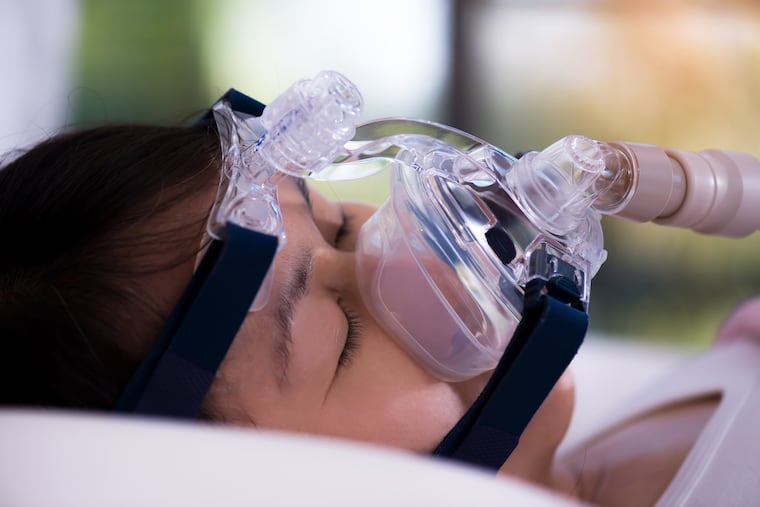The danger of untreated sleep apnea far outweighs the risk of recalled CPAP machines
Last summer, sleep apnea patients’ worlds were turned upside down when the largest manufacturer of CPAP machines, recalled 68% of their machines due to potential health concerns.

Sleep apnea is a medical condition that affects roughly 22 million Americans.
For the majority of patients, CPAP machines provide much relief from chronic fatigue (and loud snoring). But last summer, patients’ worlds were turned upside down when the largest manufacturer of CPAP machines, Philips Respironics, voluntarily recalled 68% of its machines because of potential health concerns.
In June 2021, Philips, and subsequently the U.S. Food and Drug Administration, recommended that patients discontinue use and obtain a new machine. Some were able to get a replacement through health insurance. But many — including a surprising number of my patients — had to pay $500 or more out of pocket.
A year later, many patients are still waiting for a replacement.
This has been a challenging time for physicians. For years, we have been counseling patients about the dangers of untreated obstructive sleep apnea and worried what would happen to patients who stopped using CPAP. Now, their health is in limbo as they wait for a new machine.
For those who haven’t kept up with a long list of developments since the initial recall, here are the highlights:
Philips’ CPAP machines were recalled because the noise-reducing foam surrounding the machine contained polyester-based polyurethanes that were potentially toxic and carcinogenic. Regulators were concerned that “off gassing” of these chemicals could lead to potential lung disease, cancer, or other maladies in CPAP users.
As Philips began investigating these problems, filters to “clean” CPAP machines became popular, which was confusing for patients who thought they needed to get rid of the machine. Unfortunately, these filters did not always fit. Ultimately, the FDA issued an advisory to not use ozone cleaners (which may exacerbate off-gassing) or even ultraviolet light sanitizers to disinfect machines.
As part of Philips’ remediation plan accepted by the FDA, the company contracted with five certified, independent laboratories in the U.S. and Europe to test the CPAP machines. By the end of December 2021, they’d done enough research to conclude that off-gassing does not expose people to concentrations exceeding current safety thresholds. Most recently, Philips said in a June 28 release that usage “is not anticipated to result in long-term health consequences for patients.”
Patients with affected machines should still get them replaced, but Philips and the FDA now say high-risk patients should use the machine they have until their replacement arrives because the risk of untreated sleep apnea is greater than any risk posed by the recalled CPAP machines.
Unfortunately, I still see many patients who are not using the machine. This is concerning to me and my colleagues because research shows that continuation of CPAP therapy significantly lowers the risk of death.
One study, involving 88,000 patients in France, found that those who continued CPAP therapy reduced their risk of dying by 35% compared with those who at one point used a CPAP machine, but discontinued the therapy. The study, published earlier this year in Chest, one of the major journals for pulmonologists, did not specifically look at users of Philips machines, but these results confirm that continued CPAP use is the recommended course for our patients.
So far, Philips has shipped more than 1.1 million new machines to patients eagerly awaiting a replacement. The company has promised to deliver 90% of replacement machines by the end of this year.
Philips created a website for patients to register their device to find out whether it’s affected by the recall and get regular updates. Visit usa.philips.com/healthcare/e/sleep/communications/src-update or call 877-907-7508. Most important, be sure to talk to your doctor before making any changes or stopping CPAP therapy.
Robert O. Satriale is a pulmonologist at Temple University Hospital and director of the Temple Lung Center Oaks campus.